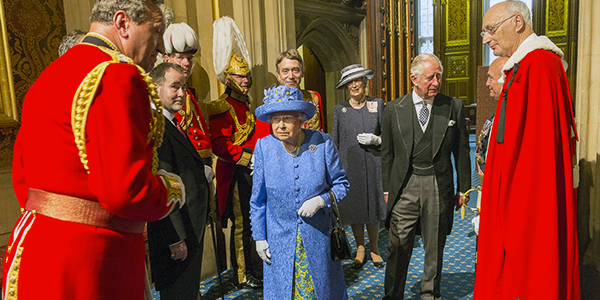The modern monarchy and prorogation: clearer rules are required
The question of the legality of Boris Johnson’s prorogation of Parliament reaches the Supreme Court this week. In this context, Craig Prescott argues that, if politicians can’t exercise restraint, then clearer rules for when one parliamentary session ends and a new one begins are needed to avoid the politicisation of the modern monarchy.

The Queen leaves Parliament after the 2017 Queen’s Speech. Picture: UK Parliament/(CC BY-NC 2.0) licence
The prorogation of Parliament until 14 October has attracted huge controversy. Legal challenges before Scotland’s Court of Session and the High Court have delivered directly opposite results, with the matter to be resolved by the Supreme Court this week. There have been many interesting blogs debating the legal issues. This piece considers the issue from the perspective of the monarchy, arguing that regardless of what the Supreme Court decides, the decision to prorogue is a symptom of deeper cross-party trends in politics, which makes reform necessary.
The modern monarchy
Despite recent controversy involving Prince Andrew, a remarkable feature of British public life has been the rehabilitation of the monarchy in public consciousness at a time when trust in other institutions has declined. Out of the difficulties of the 1990s, through a series of gradual changes, the monarchy has modernised and secured its place as a symbol of stability, continuity and tradition. This has been particularly apparent in the Monarch’s role as Head of Nation, which with the help of other members of the Royal Family, seeks to recognise voluntary service, community engagement and excellence in a non-party political context. Vernon Bogdanor describes this function of the monarchy as ‘reflecting the nation back to itself’. An example of this role is the ‘Heads Together’ campaign led by the Duke and Duchess of Cambridge and Prince Harry that challenged stigmas surrounding mental health. It is a part of a national conversation that is separate from party politics.
This avoidance of party politics is a core feature of the Queen’s reign and reflected in her position as Head of State. Generally, the this has solidified into a ceremonial role with little room for individual discretion. In terms of the key powers she acquired on taking the throne, the choice of Prime Minister is now determined by leadership contests within political parties, and as confirmed by the Cabinet Manual, in the event of a hung parliament, the Monarch appoints a Prime Minister following negotiations held by politicians. The power of the Monarch to dissolve Parliament, triggering a general election, and the possibility of refusing a request for a dissolution from the Prime Minster, was abolished by the Fixed-term Parliaments Act 2011. As seen recently, this Act empowers the House of Commons to decide whether an early general election is held.
Prorogation
Against this backdrop, it might be thought that prorogation was ripe for constitutional reform. Yet, the Fixed-term Parliaments Act expressly left prorogation untouched. In the past few years, this has been questioned by the UCL Constitution Unit, and myself on the simple proposition that it should be up to Parliament itself when its sessions begin and end and not for the government acting through the Monarch. Until the current crisis, prorogation had avoided attention because it had been reduced to a matter of ceremony. Prorogation would usually last for a matter of days, as a way to prepare for the ceremony of the State Opening of Parliament and the Queen’s Speech. There have been exceptions, such as a longer prorogation of Parliament prior to the 1997 election (this had the effect of delaying a report into the ‘Cash for Questions’ saga), and a particularly long session in 2010–2012 was justified on the basis that the move to fixed-term parliaments would allow each new session to begin in May, so regularising the parliamentary calendar. Yet, as Nikki da Costa (now returned to Downing Street as an adviser) stated in May, there are ‘no rules’ regulating prorogation. Instead the Prime Minister is expected to exercise restraint.
This lack of rules allowed Theresa May to wield the power of prorogation by not exercising it. She decided Parliament would not be prorogued until after March 2019, as the first session of the 2017 Parliament would last for two years. Although unusual, this was explained away on the basis that Brexit would require a substantial amount of complex legislation which required extra time. Politically it mapped neatly onto the two-year negotiation period provided by Article 50. A Queen’s Speech would have been the ideal way for a post-Brexit relaunch of the government. Of course, matters did not go according to plan, and the 2017–19 session lingered on, becoming the longest session since the Civil War.
This makes a Queen’s Speech an attractive option now. Although a long session does not prevent new legislation not covered by the previous Queen’s Speech (it always includes a catch-all reference to ‘other measures’), politically a Queen’s Speech would allow Johnson to set his own agenda as Prime Minister. Of course, now the government is 23 seats short of a majority, it is questionable as to how much of any Queen’s Speech would translate into enacted legislation.
Breakdown
The real issue with this prorogation is the length. According to the Scottish Court of Session, the failure of the government to ‘provide a rational explanation’ as to why Parliament must be prorogued for five weeks, led them to infer that the real intention was to restrict debate in Parliament on Brexit, which is ‘not a proper purpose for proroguing Parliament’ and so it is unlawful [paras 123–124].
Irrespective of whether the Supreme Court comes to a different conclusion, this use of prorogation is symptomatic of a more fundamental breakdown in politics. As da Costa stated there are ‘no rules’, only the restraint of prime ministers not to abuse the power to prorogation. Such restraint now appears to be only one consideration of many when guiding how politicians act. The Prime Minister seems to have calculated that the desire of enough voters to leave the EU will override concerns of constitutional propriety, even if that risks entangling the Queen in party politics.
This reflects a ‘success at all costs and on my terms’ approach, which makes compromise almost impossible. Consequently, despite the government losing its majority, MPs resolutely opposed to the government’s main policy have chosen not to move a vote of no confidence or coalesce around an alternative Prime Minister. Any government, unable to call an election and at the receiving end of legislation to which it is opposed, is likely to pull as hard as possible on whatever levers it has left. Prorogation just happened to be that lever.
The risk is of a vicious cycle where the opposition resorts to ever-more elaborate tactics to foil the government, and the government responds likewise. As the Court of Session states, such ‘procedural manoeuvres are the stuff of politics’ [para 91], but this can become counterproductive. Politics becomes gamified, and instead of seeking outcomes of substance, the aim is to achieve a fleeting and marginal tactical advantage over your opponents. In this arms race, restraint is a weakness. The courts reluctantly enter the fray to arbitrate on allegations of abuses of power.
Politicians are concerned about retaining their core support at a time when the party system is in flux. The main political parties are running not to stand still but to slow their own decline. This is shown in the rumours that if the Prime Minister loses a vote of confidence, he may refuse to resign, even if an alternative government has the support of a majority of MPs. This risks requiring the Queen to dismiss the Prime Minister. Labour has further increased the temperature. John McDonnell suggested that following a loss of confidence, Labour would send Jeremy Corbyn to Buckingham Palace in a taxi to be appointed as Prime Minister. Recently, there have been suggestions that Parliament could be prorogued again, and Johnson’s adviser Dominic Cummings has been quoted as warning that ‘the constitutional crisis is only just beginning’. In the midst of all this, the Queen is reduced to a mere pawn in this pointless game of multi-dimensional chess.
In these circumstances, any move the Queen makes is likely to trigger criticism from one side. Prorogation saw protestors marching down the Mall, and ‘abolish the monarchy’ trended on Twitter. If politics has reached the point where politicians are willing to embroil the Queen into party political controversy, then the Monarch’s role as the Head of Nation is at risk. A key benefit of monarchy is that it keeps politics in its place. If politicians can no longer be trusted to exercise restraint, then legislative reforms establishing clearer rules of the ‘game’ become necessary to secure the modern monarchy.
This article gives the views of the author, and not the position of Democratic Audit.
About the author

Craig Prescott is Director of the Centre for Parliament and Public Law and Senior Lecturer in Law at the University of Winchester.





 Democratic Audit's core funding is provided by the Joseph Rowntree Charitable Trust. Additional funding is provided by the London School of Economics.
Democratic Audit's core funding is provided by the Joseph Rowntree Charitable Trust. Additional funding is provided by the London School of Economics.
Too much parasitism, government and monarchy feed from each other living the people “clean”